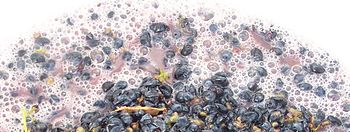
Back Fermentación del vino Spanish تخمیر در شرابسازی Persian Cuvaison French 포도주 발효 Korean Fermentação na vinificação Portuguese Fermantasyon (şarap) Turkish 發酵 (葡萄酒) Chinese

The process of fermentation in winemaking turns grape juice into an alcoholic beverage. During fermentation, yeasts transform sugars present in the juice into ethanol and carbon dioxide (as a by-product). In winemaking, the temperature and speed of fermentation are important considerations as well as the levels of oxygen present in the must at the start of the fermentation. The risk of stuck fermentation and the development of several wine faults can also occur during this stage, which can last anywhere from 5 to 14 days for primary fermentation and potentially another 5 to 10 days for a secondary fermentation. Fermentation may be done in stainless steel tanks, which is common with many white wines like Riesling, in an open wooden vat, inside a wine barrel and inside the wine bottle itself as in the production of many sparkling wines.[1][2]
- ^ Jancis Robinson (ed): "The Oxford Companion to Wine" Third Edition, pp. 267–69. Oxford University Press 2006 ISBN 0198609906.
- ^ Jancis Robinson: Jancis Robinson's Wine Course Third Edition, pp. 74–84. Abbeville Press 2003 ISBN 0789208830.